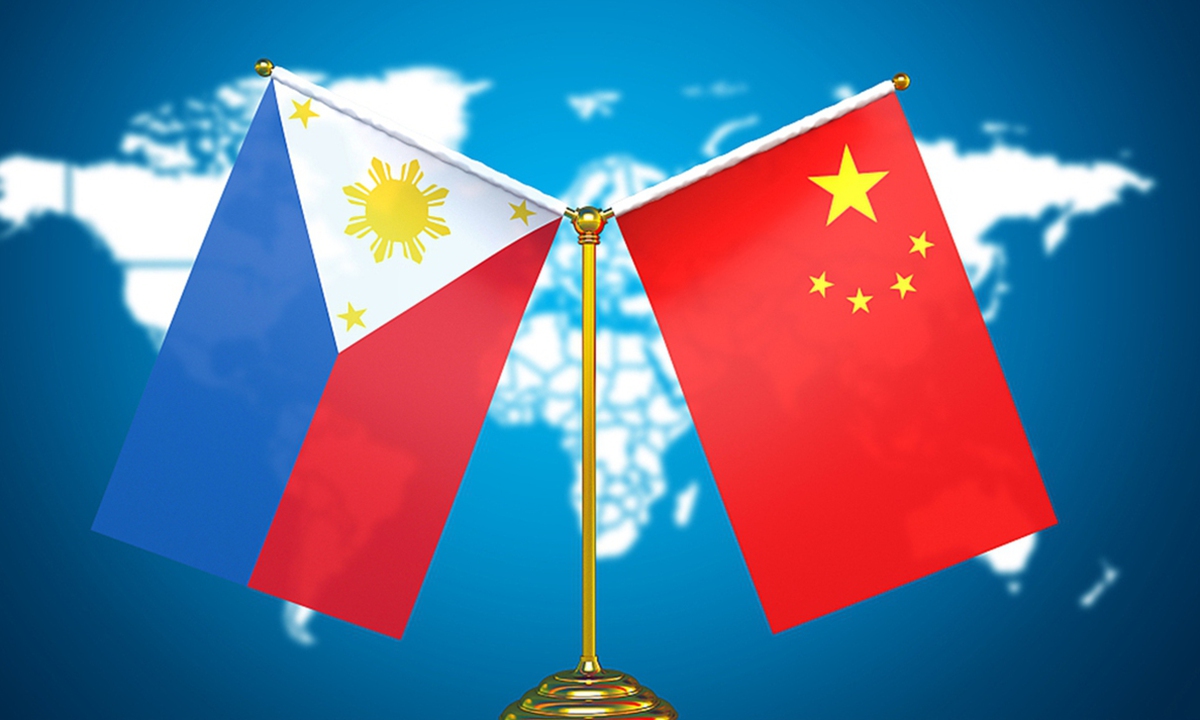
China Philippines Photo: VCG
A direct line of communication between leaders' offices of China and the Philippines will help to manage disputes in the South China Sea via diplomatic channels, and will put the brakes on the simmering tension between the two countries. It sends a signal to extraterritorial countries that Beijing and Manila are ready to manage their conflicts, experts said.
How effective this mechanism will depends largely on the Philippines' sincerity in settling down the disputes, as well as the results of coordination between different departments within the country, observers said.
The Philippines and China's communication mechanism on the South China Sea will soon extend to the two states' presidential representatives and top diplomats, the Philippines Department of Foreign Affairs (DFA) said Tuesday night, according to the Philippine News Agency.
In a text sent to the news agency, the DFA confirmed that the recently signed "Arrangement on Improving Philippines-China Maritime Communication Mechanisms" would provide various "channels for communication" between the two nations, specifically on maritime issues.
These avenues include one "through the representatives to be designated" by the Philippine and Chinese presidents. Another channel is between the DFA and the Chinese Ministry of Foreign Affairs, including at the secretary (foreign minister) and undersecretary (vice foreign minister) levels or through their designated representatives.
China is always committed to properly handling maritime issues with the Philippines through dialogue and consultation, Lin Jian, spokesperson of the Chinese Foreign Ministry, said when asked about the line at a press conference on Wednesday.
At the ninth meeting of the China-Philippines Bilateral Consultation Mechanism on the South China Sea held earlier this month, the two sides talked about improving the maritime communication mechanism between the two countries. China and the Philippines agreed to further enhance communication and dialogue between diplomatic and coast guard agencies, so as to jointly keep the maritime situation and the overall bilateral relationship stable, Lin said.
In January 2023, the two countries decided to establish a direct communication mechanism between the Department of Boundary and Ocean Affairs of the Ministry of Foreign Affairs of China and the Maritime and Ocean Affairs Office of the Department of Foreign Affairs of the Philippines, the Xinhua News Agency reported.
Chinese experts described the newly established hotline as an upgraded communication mechanism that involves higher-level diplomatic departments.
The most important function of the hotline is to help diplomatic channels play a leading role in controlling the situation in the South China Sea, Peng Nian, director of the Hong Kong Research Center for Asian Studies in Hong Kong, told the Global Times on Wednesday.
The recent maritime disputes between China and the Philippines proved that the Philippine military has sought to break diplomatic communication repeatedly, said Peng, noting that the tension between two countries is getting out of control due to lack of communication.
"Thus, the highest level of communication will help prevent disputes from escalating," said Peng.
Photos obtained by the Global Times exclusively from the China Coast Guard (CCG) on June 19 show the CCG's interception, boarding, inspection and expulsion of Philippine vessels when they illegally intruded into waters near China's Ren'ai Jiao (also known as Ren'ai Reef) in the South China Sea on June 17.
The CCG's law enforcement measures were aimed at intercepting illegal Philippine supplies and did not feature direct measures against Philippine personnel, a Chinese Foreign Ministry spokesperson said on June 19 in response to Philippine claims that the CCG confiscated Philippine guns during the incident.
Peng said establishing the hotline also sends a signal to extraterritorial countries, such as the US and Japan, that both China and the Philippines are still willing to manage the current situation in the South China Sea.
However, whether this new upgraded mechanism can ultimately work depends largely on the political will of the Philippines to resolve conflicts, as well as on coordination among different political departments within the Philippines, Chen Xiangmiao, director of the World Navy Research Center at the National Institute for South China Sea Studies, told the Global Times.
Chen said the existing mechanism is sufficient, yet Manila's constant provocations prevent the two countries from agreeing on how to manage disputes.
Apart from stirring up confrontations at sea, the Philippines is considering initiating a second international arbitration against China on environmental challenges, local media reported.
Chinese experts slammed such foul play, noting it is nothing more than a cognitive assault under the guise of legislation and a replay of the arbitration farce of 2016. The extent to which the upgraded hotline mechanism can help rein in China hawks in the Philippine military still needs to be seen, Peng said. He explained that this group of individuals are stubbornly anti-China and have close connections with the US, making it difficult to change their stance in a short period of time.




